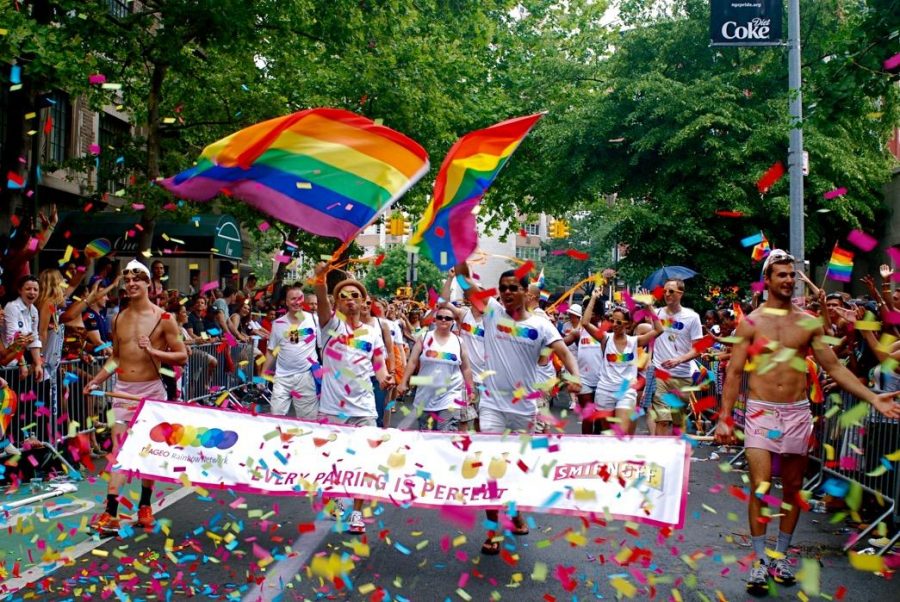By Kerry Rota
If you are a student at Fordham University, it is my guess that you have heard the phrase “men and women for others” several times throughout your time here. For each of us, this simple phrase may take on different significance.
For me, “men and women for others” means advocating for the oppressed, the marginalized and the silenced. It means upholding the fundamental dignity that is inherent in each human being. It means cultivating an environment of love, understanding and compassion through our words and actions. Ultimately, it means standing together as a Fordham community, unwavering in our support of each other.
On Oct. 11, many colleges throughout the country celebrated the 27th National Coming Out Day. Coming Out Day is an annual event that celebrates the LGBT community.
Students around the country came together in rallies and parades to provide their support to the LGBTQ community on their campuses, to honor their courage and to share in their joy.
Where were the rallies at Rose Hill? On campus, the PRIDE Alliance held a dance to celebrate the event, but by and large, the administration at Fordham chose not to acknowledge the day.
Coming out is a pivotal moment in the life of an LGBTQ individual. According to a study conducted by the Pew Research Center, the average age at which a LGBTQ individual comes out for the first time is 20 years old. Thus, this empowering event often occurs at a time in which the individual is at college, and separated from family and hometown friends. College can be a stressful time for many, as adjusting to a new schedule among a sea of strangers is overwhelming in and of itself. Now imagine how these fears and anxieties are compounded by the trepidation that may precede a person’s revelation as an LGBTQ individual.
As “men and women for others,” we are endowed with the gift and responsibility of caring for others. We become part of a proxy family for our classmates and peers. As “men and women for others,” we should strive to build a foundation of love and support, and to create an environment in which every individual feels not only welcomed, but also cherished.
Only 42 percent of LGBTQ individuals believe that the communities in which they live accept them, according to the Human Rights Campaign. More than half of these men and women fear that in revealing their sexual orientation and identity, they will be subject to intolerance and animosity at the hands of their peers.
Are we doing all that we can, as a university that prides itself on developing “men and women for others,” to propagate a culture of compassion and solidarity? I do not believe that we are. The event held by the PRIDE Alliance was not enough. There should have been a campus-wide event held to foster a welcoming environment for every Fordham student. By failing to do so, we failed to step up as allies of all LGBTQ individuals.
Despite the staggering progress that has been made towards securing the rights of all LGBTQ individuals, the fight is far from over. Throughout the world, these individuals are often targets of animosity, violence and political and social oppression. It is imperative that we are attuned to the prejudice that many LGBTQ individuals face. We cannot turn a blind eye to the discrimination that is still prevalent against the LGBTQ community. We cannot become complacent.
Many may find it unsurprising that Fordham, a Catholic university, did not host a huge celebration of this event. I do, however, find this surprising. As a community dedicated to the mission of living for others, we blatantly violated this ideal. We neglected our responsibility to the Fordham community by failing to support our classmates and friends. We ignored the struggles faced by our peers, and we failed to celebrate the lives of many wonderful people.
The phrase “men and women for others” should come without qualification. We are not “men and women for some.”
Kerry Rota, FCRH ’17, is a psychology major from Princeton, New Jersey.










































































































































































































James Demetriades • Dec 7, 2015 at 9:44 pm
PRIDE Alliance holds an annual coming out day, last year we held a Coming out day dance and despite advertising it was attended by 30 students. Part of the problem is the community. I was VP of PRIDE, and every year I was involved in PRIDE, from 2011 to 2015 we handed out free t-shirts and had a special meeting dedicated to coming out as well as an additional event which changed each year.